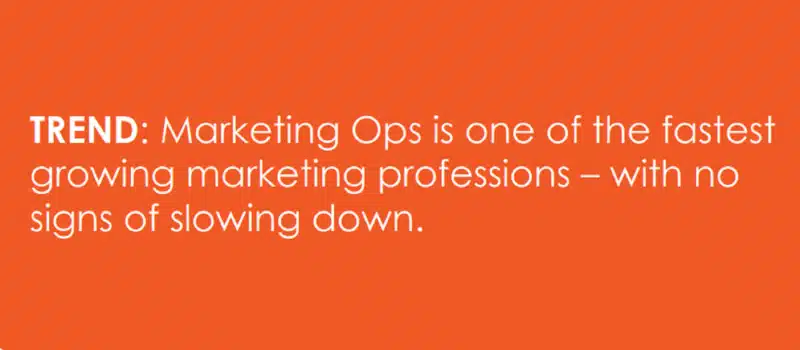Why marketing ops professionals are on the front lines of marketing
Marketing ops is critical to the most important things marketing organizations do today.
“Marketing operations is one of the fastest-growing marketing professions — and it shows no signs of slowing down.” That’s how Darrell Alfonso, who works in Global Marketing Operations for Amazon Web Services, kicked off day two of MarTech.
There are currently no fewer than 61,000 job openings on LinkedIn which refer to “marketing operations” in the U.S. alone. Right now, there’s not enough talent to fill all these positions. It’s at the front of CMO’s minds because of the value it can bring.
Where marketing ops is critical
To drill down further, Alfonso listed some of the elements of marketing where the role of operations is critical:
- Data. Data needs to flow seamlessly between systems and to be available to users;
- Revenue. It’s important to know how marketing activity impacts revenue;
- Efficiency. Successful marketing programs need to be iterable and scalable;
- Effectiveness. Marketing operations creates the analytics which provide insight into performance for brands; and
- ROI. For every dollar that is spent, what’s the return?
The importance of operations leads to it having control of more of the budget. “And where the budget is present, vendors, businesses and overall industries follow.

Fistfuls of dollars
The part of the budget Alfonso had in mind is the budget for new initiatives — a new conference, a product launch, the use of new social media channels, and so on. “The first thing [CMOs] have to ask is, do we have the resources, talent and capability?” That, says Alfonso, is a question for marketing ops and it will reveal where investment is needed.
What’s more, marketing opertions is the part of the marketing organization leading complex projects like data migrations and system integrations. That eats up budget too, especially when agencies and consultancies are involved.
Finally, as is obvious, marketing ops professionals are key players on marketing tech buying teams, and often the decision-makers.
On the front lines
It’s clear from the above that marketing ops, far from being back-room button-pressers, are on the front lines when it comes to identifying challenges faced by the marketing organization — as well as being tasked with finding solutions. Alfonso admits, from personal experience, that can include finding out that the data or technology to confront a particular challenge is just not available.

This has led to marketing ops professionals founding their own companies to create the solutions marketers need. Examples are Syncari, which helps normalize data between different platforms (Alfonso is an adviser to Syncari); MadKudu, a data science platform to predict lead quality; Tealium, a CDP which draws together data from various sources to create a single source of truth; and Stack Moxie, which monitors marketing stack performance and provides QA. There are many other examples, of course.
Dig deeper: Strategic marketing ops leaders can earn a seat at the top table

Takeaways
Given all this, how can marketing ops professionals be best supported?
- Give them a seat at the table and the necessary authority to address the most pressing challenges;
- Consult them, especially on major projects;
- Involve them in strategy (strategy should drive technology, not vice versa);
- Search for marketing ops professionals who are creators, builders, makers.
What does that mean? “With marketing operations and martech,” said Alfonso, “you always want to keep the customer at the center and you want to create and invent on their behalf. When you do that wonderful things start to happen…and high-value business outcomes follow.”
Watch the full presentation here (free registration required).
Contributing authors are invited to create content for MarTech and are chosen for their expertise and contribution to the search community. Our contributors work under the oversight of the editorial staff and contributions are checked for quality and relevance to our readers. MarTech is owned by Semrush. Contributor was not asked to make any direct or indirect mentions of Semrush. The opinions they express are their own.
Related stories